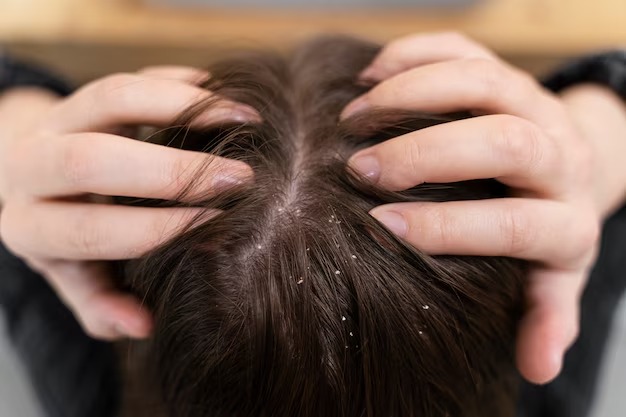Have you ever brushed your hair with a comb and wondered if dandruff Cause hair loss? You are not alone, though. Many individuals are curious about the relationship between these two prevalent scalp problems.
Therefore, can dandruff cause hair loss?
Yes, but it is challenging and requires thinking through several times. This means that dandruff does not directly cause hair loss since hair’s lifespan determines hair loss. However, the itching and inflammation accompanying such a rash may become detrimental to hair follicles if one scratches the area excessively, leading to temporary hair loss.
Now, it is time to describe the process in more detail.
What is Dandruff?
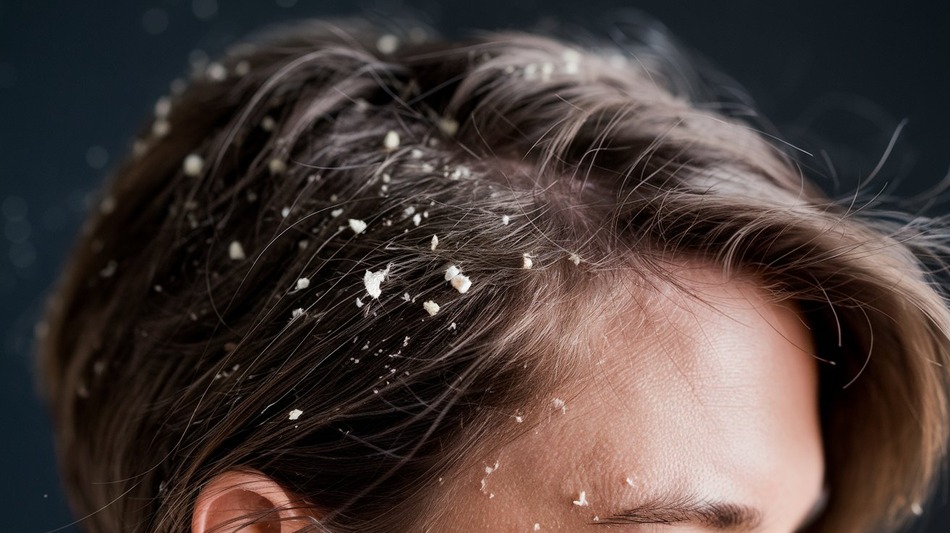
Dandruff is the dry skin you shed from your scalp, often appearing as white or yellow flakes on your hair and shoulders.
This condition can result from various factors, including:
- Skin Dryness: When your scalp becomes too dry, it can lead to flaking.
- Harsh Hair Products: Certain shampoos, conditioners, or styling products can irritate the scalp, causing dandruff.
- Malassezia Fungus: This yeast-like fungus naturally exists on the scalp but can become overactive, leading to increased flaking and irritation.
Comprehending these causes is essential for effectively managing dandruff and maintaining a healthy scalp.
What are the symptoms of dandruff?
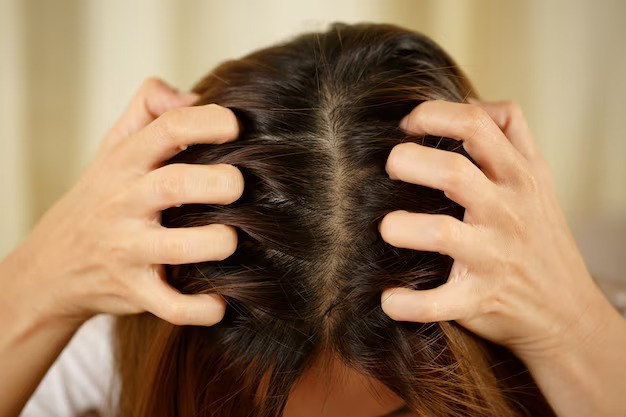
Common Symptoms of Dandruff
- Flakes: One of the most noticeable signs of dandruff is the presence of white or yellow flakes. These flakes can appear on the scalp, hair, and shoulders. They are usually more visible when you brush or scratch your scalp.
- Itchy Scalp: An itchy scalp is a common symptom of dandruff. This itchiness is caused by irritation due to the excess shedding of skin cells on the scalp.
- Redness or Irritation: Redness and irritation on the scalp often accompany dandruff, particularly if the skin is inflamed due to scratching or sensitivity to yeast buildup.
- Dry or Oily Scalp: Dandruff can occur on dry and oily scalps. A dry scalp may lead to more flaking, while an oily scalp can contribute to the buildup of skin cells and sebum, making flakes appear more yellow.
What or Who is Responsible for Dandruff
Many people may underestimate the problem of dandruff, regarding it simply as a condition that causes excess flakes. However, dandruff can indicate underlying issues that may lead to more severe problems, including hair loss.
One significant factor is zinc deficiency, which can contribute to scalp health issues. Zinc is crucial in maintaining healthy skin and hair; lacking it can exacerbate dandruff and lead to inflammation. This inflammation can weaken hair follicles, potentially resulting in hair loss if not addressed.
In addition to zinc deficiency, other contributors to dandruff include:
- Dry Skin: This is the most common cause of dandruff.
- Malassezia Fungus: A yeast-like fungus that thrives on the scalp and can lead to flaking.
- Sensitivity to Hair Products: Some people may react negatively to certain shampoos or styling products.
Understanding these factors is essential in addressing dandruff effectively and preventing its potential consequences, such as hair loss.
Strong chemical products can irritate your scalp and worsen dandruff. Choose gentle, natural products to maintain scalp health.
How can dandruff lead to hair loss?
Thus, whenever dandruff goes haywire, it produces itching. Any harsh rubbing of the scalp can cause the hair follicles to be injured or pull off the hair that is still growing. This is like attempting to tear a plant apart; it slowly debilitates the roots and unhinges them.
The more you scratch, the more hair you lose. But here is the good news – this hair loss does not have to be permanent. You have to sort out the dandruff situation for yourself.
Can Dandruff Cause Hair Loss?
Absolutely! Here’s how it works: Another sneaky way dandruff cause hair loss? Inflammation, Itching and Scratching.
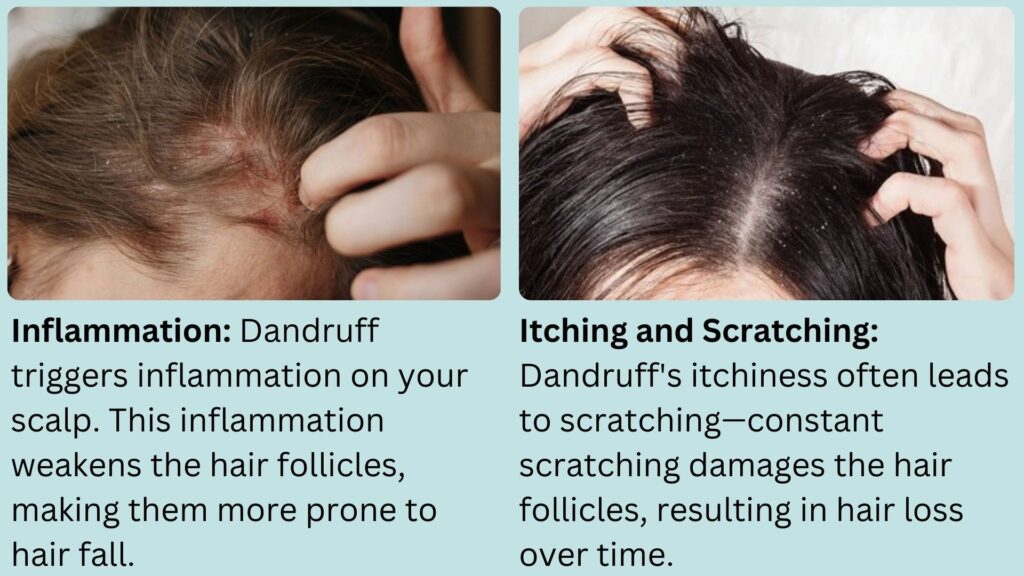
So, while dandruff itself doesn’t directly cause hair loss, its side effects—like inflammation and scratching—certainly contribute to it.
Types of Hair Loss Linked to Dandruff
Telogen Effluvium: This temporary type of hair loss is often triggered by stress or illness. When dandruff is severe, it can increase inflammation and Stress on the scalp, pushing more hairs into the resting (telogen) phase, which leads to more hair shedding.
Seborrheic Dermatitis: A more severe form of dandruff, this condition causes red, greasy patches on the scalp. It’s marked by inflammation and flaking and, if left untreated, can result in noticeable hair thinning due to follicle damage.
Risk Factors for Dandruff-Related Hair Loss
Ensure your diet includes foods rich in vitamins, zinc, and omega-3 fatty acids, which can help promote scalp health and reduce dandruff.
How to Tackle Dandruff and Prevent Hair Loss
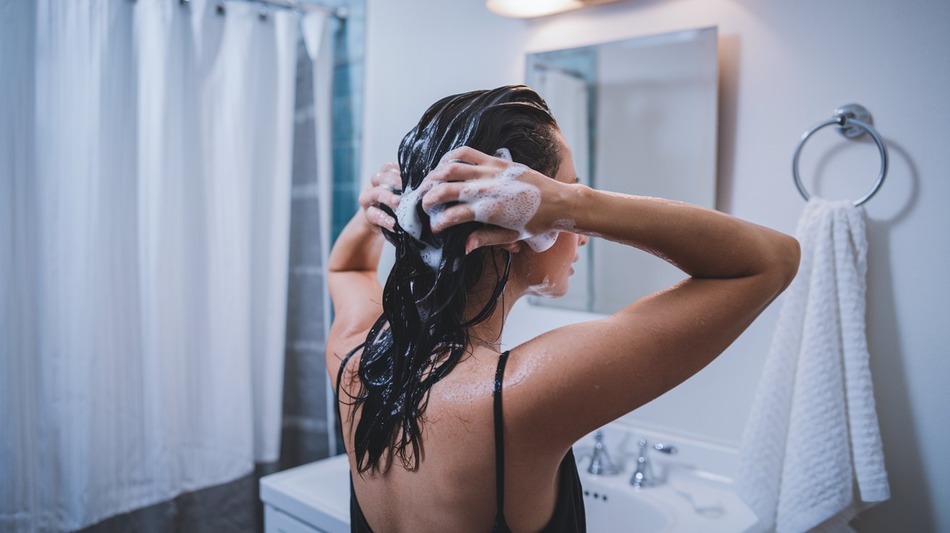
Here’s what you can do:
Regular washing is critical. It helps remove flakes and keeps your scalp healthy, reducing the chances of irritation that can lead to hair loss.
Hot water strips your scalp of its natural oils, which can worsen dandruff by drying it out. Stick to lukewarm water to keep your scalp healthy and moisturised.
Look for shampoos with active ingredients like zinc pyrithione or ketoconazole. These ingredients target the fungus responsible for dandruff and help control it.
Dryness can exacerbate dandruff. Try natural oils like coconut or tea tree oil to keep your scalp hydrated and reduce flaking.
Stress plays a significant role in dandruff flare-ups. Practice mindfulness, meditation, or yoga to manage stress levels and protect your scalp from dandruff-related hair loss.
Look for shampoos with zinc pyrithione, ketoconazole, or selenium sulfide to control dandruff and reduce scalp inflammation.
Can Dandruff Cause Permanent Hair Loss?
A common concern is: Can dandruff cause permanent hair loss?
Relax—the answer is no. Dandruff can lead to temporary hair thinning, especially if you’re scratching and irritating the scalp. However, your hair grows strong and healthy once you treat the underlying scalp issue. Permanent hair loss from dandruff is rare, and with the proper treatment, you can reverse any damage caused by itching or inflammation.
Excessive use of heat tools like straighteners and blow dryers can dry out your scalp, aggravating dandruff and causing hair to weaken and fall out. You can use heat sparingly.
When Should You Advice a Doctor?
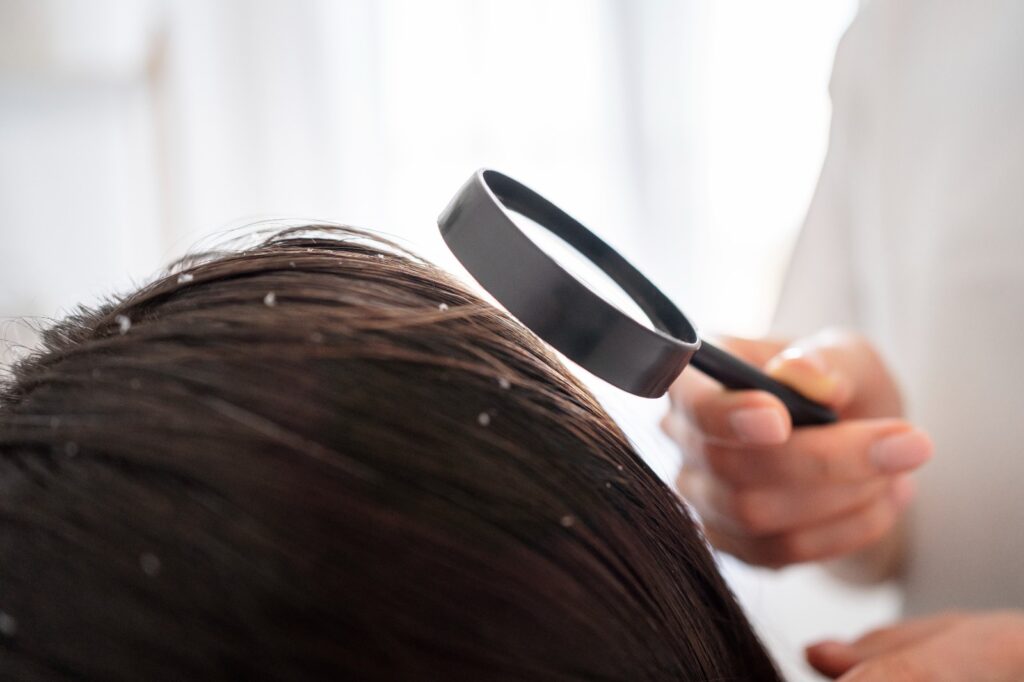
If you’ve tried everything and your dandruff won’t budge, it might be time to consult a dermatologist. They can help determine if there’s an underlying condition causing both your dandruff and hair loss.
A dermatologist can conduct a thorough examination and provide a proper diagnosis. They may recommend additional treatments or tests to identify underlying issues contributing to your persistent dandruff and hair loss concerns.
Please seek professional help if home remedies and over-the-counter treatments fail to provide relief. Early intervention can help prevent further hair damage and loss.
If dandruff persists and hair loss becomes noticeable, see a dermatologist. They can help diagnose underlying conditions like seborrheic dermatitis or fungal infections.
Conclusion
Dandruff can indeed cause hair loss if left untreated. The inflammation, itching, and scratching associated with dandruff can weaken hair follicles and lead to excessive hair shedding.
To prevent dandruff-related hair loss, it’s crucial to maintain good scalp hygiene, use anti-dandruff shampoos, moisturise the scalp, and manage stress levels. Regular washing helps remove flakes and keep the scalp healthy, while anti-dandruff shampoos containing zinc pyrithione or ketoconazole can fight the fungus causing the dandruff.
If home remedies and over-the-counter treatments fail to provide relief, it’s advisable to consult a dermatologist. They can help determine if any underlying conditions are causing both dandruff and hair loss and provide appropriate treatment options.
Remember, addressing dandruff early can save you from worrying about hair loss later. Stay proactive, keep your scalp clean, and don’t hesitate to seek professional help if needed. You can maintain healthy, luscious hair by caring for your scalp health.
FAQs
Can dandruff directly cause hair loss?
Yes, dandruff can lead to hair loss. The inflammation and irritation caused by dandruff can weaken hair follicles, resulting in increased hair shedding.
What are the leading causes of dandruff?
Dandruff can be caused by several factors, including dry skin, sensitivity to hair products, and a yeast-like fungus called Malassezia, which thrives on the scalp.
How does scratching affect hair loss related to dandruff?
Scratching an itchy scalp due to dandruff can damage hair follicles and lead to hair loss. The physical trauma from scratching can exacerbate the problem.
How can I treat dandruff to prevent hair loss?
To treat dandruff, maintain good scalp hygiene by washing regularly with anti-dandruff shampoos containing ingredients like zinc pyrithione or ketoconazole. Additionally, moisturizing your scalp and managing Stress can help.
When should I see a doctor about my dandruff?
If you’ve tried over-the-counter treatments and your dandruff persists or worsens, it’s advisable to consult a dermatologist. They can identify any underlying conditions that may be contributing to both your dandruff and hair loss.
Is it possible for hair loss from dandruff to be permanent?
In most cases, hair loss due to dandruff is temporary and reversible with proper treatment. However, chronic inflammation and severe cases may have more lasting effects if not addressed promptly.
Can lifestyle changes help reduce dandruff and prevent hair loss?
Yes, lifestyle changes such as managing stress levels, eating a balanced diet, and practising good scalp hygiene can significantly reduce dandruff and help prevent associated hair loss.
Can dandruff cause hair thinning?
Dandruff can cause hair thinning, especially in severe or long-term cases. Over time, the inflammation and damage to the hair follicles may result in finer and less dense hair strands.
Does stress worsen dandruff and hair loss?
Yes, stress can exacerbate both dandruff and hair loss. High stress levels can disrupt the scalp’s natural equaliser, increasing oil production, inflammation, and hair shedding.
